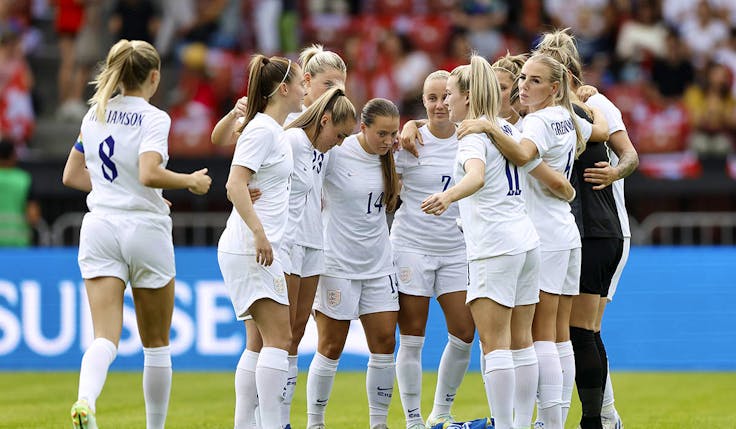Brands are missing the biggest commercial and cultural opportunity in women’s sport
If brands invest in grassroots sport, their investment will deliver long after the big tournament buzz.
 Brands are missing the biggest commercial and cultural opportunity in women’s football.
Brands are missing the biggest commercial and cultural opportunity in women’s football.
The conversation around how brands can support the women’s game is largely focused on big sponsorship deals and England player-fronted campaigns. This activity has its place in driving the commercialisation of women’s football – and women’s sport more widely – but brands are missing a trick when it comes to the opportunity.
Big tournaments are always standout moments. A couple of months ago, our women’s sport-focused agency See You At Jeanie’s was alive with ideas for how we utilise one of the largest women’s sport events of the year, the Euros, to inspire more brands to invest.
A carefully worded LinkedIn post or another women’s sport panel were not high up on our list. Instead, we wanted to create a more meaningful result. So we turned to the thriving scene of grassroots.
Women’s sport shows ‘unprecedented’ digital growth despite broadcast dip
London-based Goal Diggers FC is one of the best examples of how community football for women and non-binary players is at the heart of the women’s game.
After England won the Euros in 2022, the BBC coined the phrase ‘Lioness Effect’ to describe the surge in popularity and participation in women’s football in England. Some 1,500 women and girls’ teams registered to start to play football. This was extraordinary. After decades of work to increase visibility of the game and encourage women and girls to play, finally, change was happening.
Taking Goal Diggers as an example, spending time with the team we saw how considered their approach was, from coaching new players to helping others return from injuries and a thriving over 40s group. Their mantra of ‘availability not ability’ was just one of a strong set of core values that speaks to inclusivity and respect for all. The idea is that if you turn up, you play, no matter how good you are.
Off the pitch was even more impressive. A community that supports each other and has a lot of fun together– after training pub nights, trips overseas, the ultimate fan group for the professional game – who wouldn’t want to be a Goal Digger?
But like many grassroots teams, the money isn’t consistently flowing.
Getting your tactics right
As marketers, our minds then started to think about what a compelling partnership opportunity Goal Diggers FC could be for a brand. We reminisced that in our old agency lives, clients would see a cultural sporting event like the Euros and ask: ‘What can we do to be part of the story without being an official sponsor?’
Quickly, brands would issue a brief mainly looking for a stunt. The budget attached to this was often about £15,000 to £20,000.
But ambush marketing and tactical ads don’t sit well within the women’s sport community.
Often without a real understanding of the fans such work manifests as a giant projection on a landmark or some cringey play on words that takes something masculine, like the name of a pub, and ‘feminises’ it. This can feel performative and frivolous to women who play and support football.
‘On the front foot’: Brands urged to ‘invest ahead of the curve’ in women’s sport
Brands also tend to focus on the earnest versus the engaging in their advertising. With little understanding of the women and girls that play, creative turns to highlighting – and often not solving – the perceived issues that women’s sport has from periods to girls falling out of sport. It’s the easy way in.
We’re not saying brands should direct all marketing spend into grassroots. We still need to continue to drive awareness of our sports. There are many excellent commercial opportunities in leagues and with clubs, and an excitement when new brands invest. But for those brands freshly entering the space who want to test the water or a brand that leans into communities, grassroots is an excellent place to start.
Brands need to invest this marketing budget into grassroots sport. Be creative. Reach a highly engaged audience and subsidise those who struggle to afford to play.
Around a third (30%) of consumers say that if price was taken out of the equation, they would choose one brand over another if they were involved in women’s sport sponsorship at community and grassroots, according to the Women’s Sport Trust. Some 43% feel more positive towards brands that engage local communities through their women’s sports sponsorships.
Brands need to tackle their women’s sport creative barrier
The word ‘grassroots’ can conjure up a myriad of images. For some it’s a muddy field on a Sunday where your dad used to play. For others, it is children dribbling around cones in coloured bibs. We believe women’s sport has started to shift that landscape.
The women’s teams that have developed are brands in themselves; they are inherently creative and innovative. They are being built by generations who crave real life connection and want to meet new friends. With drinking on the wane and the cost-of-living crisis eating into social activities, having a weekly commitment to meet for a kick around is a perfect antidote to what has become an epidemic of loneliness.
Non-competitive football community Gals FC describes itself as the ‘friendliest place to play football.’ The collective has tackled the fear many women feel about joining a sports club by replacing coaches with ‘Vibe Protectors’ who are there to make sure everyone feels welcome and has fun. Run by two female founders, the brand and community has resonated. Gals FC now has over 450 players playing across the country with a mission to get 150,000 women playing.
Grassroots make brands’ budgets go further
Grassroots football is more than sport – it’s culture, identity and lifestyle. These communities are inherently creative and are building their own brands from the ground up.
Goal Diggers FC recently created a T-shirt range with fashion lifestyle brand Art of Football. One shirt reclaims the word ‘WAGs’ by featuring the dogs of the Lionesses. There is also the new football festival ‘Get Your Kits Out’ in Liverpool that celebrates the crossover between grassroots football and fashion.
There is no shortage of ideas in these teams. After decades of being repressed as fans and players, there is a need to express personality and passion.
Brands need to invest in women’s grassroots football – not just to build deeper brand affinity and reach a passionate audience, but to make marketing budgets go further. These partnerships deliver long after the tournament buzz fades.
Chair of Goal Diggers FC, Gaia Laidler, explains the team had good brand partners before, but the opportunity hasn’t been fully realised.
Women’s sport viewership grew in 2024 but total hours watched drops, data suggests
“You’ve got to know us to show us,” she explains.
Superficial campaigns don’t work. Genuine understanding and insight are essential. Supporting grassroots women’s team gives brands the opportunity to feel the vibe, understand the ethos of the clubs and see how the values are on show everywhere you look. The storytelling opportunities are endless.
As the Lionesses prepare for their Euros semi-final tonight (22 July) we will no doubt see another spike in team registrations, and women and girls of all ages connect with football. Grassroots partnerships is the opportunity to reach this audience and connect with them around a passion point.
Laura Weston and Jules Hilson are cofounders of women’s sport consultancy See You at Jeanie’s. Weston led the agency that launched the Women’s Super League and has worked in sport marketing for 25 years. With 20 years’ experience, Hilson previously worked as executive creative director for Puma’s agency, MSL.






